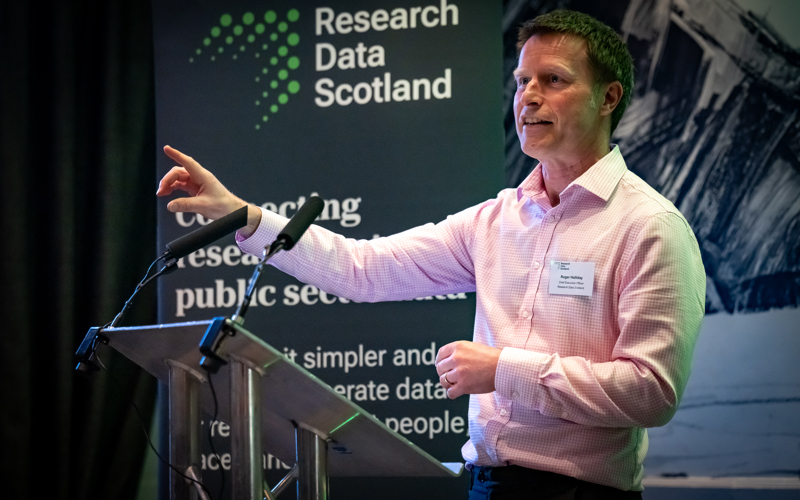
Pioneering simpler access to Scotland’s public data
Our CEO Professor Roger Halliday talks about the benefits of the Researcher Access Service, and how researchers can navigate it.
Roger Halliday
09 Dec 2024

According to the Scottish Government and National Records of Scotland, antidepressant prescribing in Scotland has increased over the last 30 years and continues to increase, with one in five adults receiving antidepressant prescriptions in a year, and more than half of those (six in ten adults) receiving long-term treatment over two or more years [1].
With these figures continuing to rise, it’s vital that we enable researchers to generate timely insights that improve our understanding of the effects of antidepressant use, guiding policy decisions and improving lives.
Funded by Research Data Scotland (RDS) through the Accelerator Awards, this research project explores the impact of how antidepressants are prescribed for people with severe mental illness.
The study is led by Matthew Iveson, Senior Research Fellow at the University of Edinburgh, and was among the first to access data through the Researcher Access Service.
Launched in April 2024, the Researcher Access Service makes it faster and simpler for researchers to access data through a streamlined approvals pathway. At launch, nine of Public Health Scotland’s (PHS) most frequently requested datasets are available through the streamlined service, in areas including prescribing, mental health inpatients, births, deaths and others.
This project uses electronic prescribing records to examine patterns of antidepressant use within patients living with severe mental illness and track changes to treatment - such as frequent switching between different antidepressants.
It also aims to examine the consequences of these patterns in terms of the healthcare utilisation and mortality risk of individuals living with severe mental illness.
“Applying through the Researcher Access Service felt faster and more straightforward than the PBPP route that I'm used to, and the frequent communication with eDRIS and RDS staff on the portal has been really useful.”
Matthew Iveson’s previous research has involved building an improved understanding of life-course predictors of depression, using electronic health records from the whole of Scotland. Much of Matthew’s past research has utilised the Public Benefit and Privacy Panel (PBPP) pathway for requesting access to data, which often involves additional time, resources and administrative work for researchers.
When applying for data through the PBPP pathway, researchers first work with the eDRIS (Electronic Data Research and Innovation Service) team at PHS to develop project requirements and prepare their application. The application is then submitted to the PBPP panel, where each project is individually considered.
While this approach is designed to ensure that projects meet requirements for demonstrating public benefit and proper information governance, it can be confusing and time-consuming and can lead to significant delays in researchers being granted access to data.
The Researcher Access Service streamlines this process by introducing a risk-based assessment at the first stage of the approvals process. If the project meets the criteria for the Researcher Access Service, the application is fast-tracked through a streamlined pathway via a dedicated approval panel, enabling faster access to data for certain projects, without compromising on the security of the data.
For a previous study using around half the number of datasets and with around a tenth of the sample size, Matthew found that the PBPP data access process took around five months. Using the Researcher Access Service, Matthew’s journey for his current project took just 97 days.
Matthew said: “Applying through the Researcher Access Service felt faster and more straightforward than the PBPP route that I'm used to, and the frequent communication with eDRIS and RDS staff on the portal has been really useful. The service won't be applicable to everyone, but if you're only planning to use the core datasets in your research and are happy to use the National Safe Haven then it will definitely save you time and effort.”
The impact of faster, simpler data access cannot be overstated. By streamlining the data access process, Research Data Scotland is ensuring that researchers spend less time overcoming administrative hurdles and more time on what matters most — generating insights that can improve, and even save, the lives of people in Scotland.
Find out more about how the Researcher Access Service works.
Through the Researcher Access Service, Matthew was granted access to data about people who have been admitted to hospital due to severe mental illness, including severe depression, bipolar disorder and schizophrenia. The researchers are using this data to explore patterns in the ways people have been prescribed antidepressants over their lifespan, and whether these patterns suggest consequences in areas such as healthcare utilisation or mortality risk.
The project uses specific datasets that are available through the Researcher Access Service, including:
The research project is still ongoing, but so far Matthew and his team have been exploring the datasets, including over 4 million hospital events, and examining antidepressant prescribing patterns across 170 million prescribing records.
To learn more and stay updated on the team’s research, visit the project blog.
Understanding the patterns and consequences of antidepressant use can improve the lives of those living with severe mental illness by helping them to find effective treatments quickly.
The research project’s findings will help inform clinical decision making in these complex cases and minimise treatment burden on those living with severe mental illness.
Furthermore, the researchers will produce tools that add value to national prescribing data, making it easier to examine treatment response and to track medication use in future research. The research team are also planning to run a stakeholder workshop, bringing together patients living with mental illness, medical professionals and healthcare policy makers to highlight medication-related challenges faced by patients and to co-design meaningful changes to policy.
In December 2024, Matthew shared his perspective on using the Researcher Access Service at our webinar. Learn more about Matthew’s ongoing research and his experience with the service:
To learn more and stay updated on the team’s research, visit the project blog.
Image credit: Neuronal synapse, artwork. Stephen Magrath. Source: Wellcome Collection.
Related content

Our CEO Professor Roger Halliday talks about the benefits of the Researcher Access Service, and how researchers can navigate it.
Roger Halliday
09 Dec 2024

Research Data Scotland (RDS) has awarded approximately £50,000 in grant-funding to three projects as part of its Accelerator Awards, promoting research for the public benefit in Scotland.
Research Data Scotland
19 Apr 2024